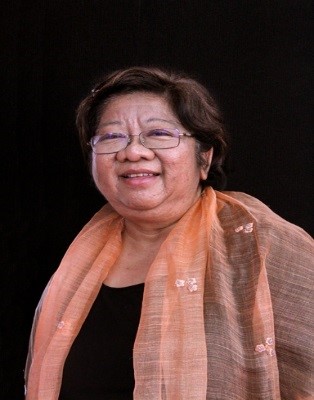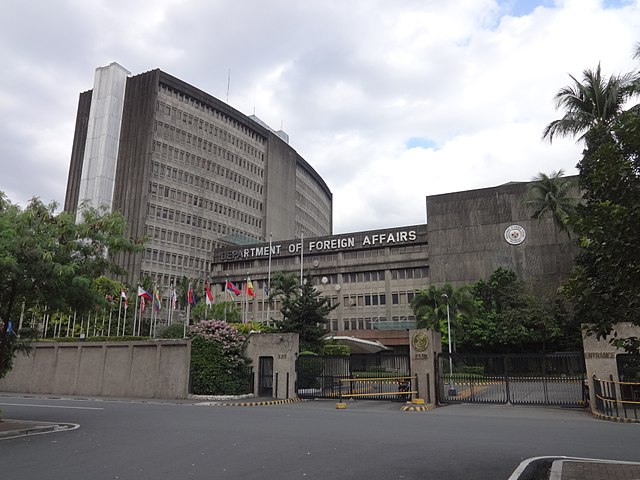Some dreams are not made of laces and frills.
To Consul General Rosalita Prospero of Toronto, the dream was simply to work in an impressive building along Roxas Blvd. in Manila.
That was the young Rosalita dreaming every time she and her Dad, Ramon, drove down the famous boulevard from their home in Cavite. When probed, she said, she did not even know what she wanted to be at the time that she was saying that. The building she is referring to is the Asian Development Bank building that eventually housed the main headquarters of the Department of Foreign Affairs (DFA). Amazing coincidence, isn’t it?
The Road to A Foreign Service Career
ConGen Prospero’s journey to a foreign service career either was not as clear as a planned path for her nor was it any near being an environment where the likes of doctors or lawyers in a family or clan were bred or thrown into as a family tradition. The good consul though is proud to have come from a family of teachers or educators, from great-grandparents to her own mother, Aurora, a native of Imus, Cavite. This is how, she thinks, her eyes were opened and consciousness awakened to serving unreservedly, and with a great sense of fairness and charitable heart.
Just like any other college girl, her idea of a line of a profession to go into or end up with, seesawed from one interest to another. From becoming a doctor to a lawyer or to, maybe, a writer. But a writer indeed she became at a very young age of 20. She was a freelance writer and a regular contributor to the Super Shots, a popular sports magazine in the ‘80s.
But it was actually her first serious job with the Department of Science and Technology (DOST) as an international science relations officer that fuelled her interest in foreign affairs. The job called for coordinating with the DFA, the foreign-assisted projects of DOST. It was such close and continuous liaison with the DFA and exposure to international projects of DOST that paved the way for her to consider a career in foreign service.
“A DFA job entails a lot of writing and analytical exercise,” she remarked. And in both of these skills, she, fortunately, had been honed with her previous jobs, including her freelance writing experience.
Simply lucky, Grateful to be where she is
In Canada, the DFA as an organization is headed by Ambassador Petronila Garcia, whose base is in Ottawa. Her Office is called the Philippine Embassy in Canada. Under Philippine Embassy are three (3) Philippine Consulate General (PCG) offices – one in Vancouver, British Columbia (headed by Consul General Mei-An Austria); one in Toronto, Ontario (by Consul General Prospero) and the recently created PCG in Calgary, Alberta (headed by Consul General Bert Asuque).
Additionally, there are three (3) Honorary Consulates in Canada headed by prominent and respected by Fil-Canadians from their respective communities. The offices are in Halifax Winnipeg and Edmonton.
These Consulates have a physical office and are required to open 5 days a week. The headship though is a pro-bono position. They can 1) issue visas, 2) certify affidavits with certain limitations, 3) extend assistance to nationals in distress; and 4) help promote Philippine culture, trade and investments.
It should be true that to many Filipinos or maybe even non-Filipinos, foreign service seems to be a very fascinating and glamorous job. A diplomat’s career path is too well-defined and structured that even as the path narrows as one goes up the executive ladder, the hardworking aspirant keeps his eyes keen on the prize – that is, to be able to serve his kababayans (fellow Filipinos) with the much-coveted title of consul, deputy consul or maybe as consul general.
“I think I am just lucky, and for that, very much grateful, “ the very humble Consul General stated.
She continued, “Toronto is my first “solo” posting as head of my own office (away from the main headquarters of an embassy, that is).” There was fear, she added, but her mentors assured her that it was time.
But first assignment away from the Manila headquarters was really Sydney, Australia as vice consul and then consul. “It is in Sydney where I learned the ropes of this role,” she admitted. This posting also allowed her to squeeze in a Master’s degree in international studies at Sydney University, attending classes in the evening and working at the Consulate General in the daytime. She finished her Bachelor’s in Psychology from the famous Diliman university, University of the Philippines (UP).
The next posting was even more enviable. It was France. She served as Minister and Consul General in the Embassy for half of her tour-of-duty. In the second half, she was asked to serve as Minister and Permanent Deputy Representative to United Nations Educational, Scientific and Cultural Organization (UNESCO), whose office is also at the Philippine Embassy in France.
Carrying Toronto on her back
As the dear old saying goes, “diplomats are like turtles. They carry their home on their backs, “ the ConGen mentioned in jest but affirmed, it is true. No permanent address, in other words. While ConGen Prospero has skipped marriage (for now, maybe) and has lived away from her nuclear family, she does not feel alone, she assures. She is with people, a lot of people every day in her work as a diplomat. When she is not with them or in her office, she is experimenting with her culinary skills or exploring the exciting Toronto.
Speaking of Toronto, and putting up consulates, she informed that for the DFA to consider putting up a PCG office in a country, they look at some factors like 1) the number of Filipinos in the area which has to be really sizeable ; 2) the potential for establishing trade and investments with the Philippines, and 3) the opportunities it will present in promoting our history and culture.
Toronto has definitely been a strategic and vibrant place for the Philippines to achieve such objectives. As mentioned, for the good ConGen, Toronto was her first chance to administer her own office away from the wings of the embassy which, in Canada, is based in Ottawa. But she also banked on her experience with her stints in the US Division of the DFA that handles affairs in North America, including Canada.
Facing Up to the Problems of Skilled Immigrants
Similarly, in Vancouver, ConGen Prospero is faced with the persistent problem of our skilled immigrants taking up menial jobs, supposedly at the beginning of their immigration. But many others get stuck and are never able to integrate into the workplace of their desire or assimilated into their rightful professions.
“Some simply just give up, stop trying and focus on earning a living to support their own families and or help families in the Philippines,” she lamented.
But the PCG is not giving up. “We are aware that many of what we hope to accomplish in the area of credentials recognition or accreditation of our skilled professional are a long shot, but we continue to make representations,” she bravely stated.
Consul Edna May Lazaro, who joined our conversation, contributed the fact that colleges (speaking here about the body that regulates its own ranks like the college of nurses for all nurses) and the federal government of Canada are two (2) independent bodies. As it is, their views differ in terms of fast accreditation of our skilled people in this country.
Both of them recalled a time when our nurses would just be asked to take a board exam and if they pass that, they are allowed to practice their profession. But not anymore. As some of our nurses would lament today, “Parang dumadaan sa butas ng karayom.” Only the persevering and the brave survive.
The two cited, however, the case of the Filipino accountants in Canada. They are proud of this group because unlike many others, this group has closely bonded together and carefully chart their course to be able to get their own recognition in their field. They have been successful so far, and more importantly, have been guiding their fellow accountants. Our dentists, lawyers, architects are going the same path. Hopefully, they will also be as successful.
Understanding home-Grown professionals
From the point of view of Canadian graduates though, Filipinos or non-Filipinos, like a true diplomat, the ConGen wants everybody to be kind and to understand that it is only natural to “protect your own ranks.”
To this author’s mind, may be as well, as to protect the integrity and quality of the healthcare system, for example. The heart of the matter is empathy. If the situation is reversed, it is understandable that any homegrown professional would have second thoughts about readily moving over or giving away his space to everybody else who just came in, nor would any government of a developed country allow the quality of its healthcare system, for example, to wane by plainly loosening up.
She, therefore, advised that the best and most practical solution is- to know the Canadian system fully.
“When you come in and are determined to practice your chosen profession, work at learning the ins and outs of the system,” she further said.
Unfortunately, the truth is, not many will be willing to give away the “secrets” or their strategies as to how they worked their way around. One has to painstakingly endeavour to learn his own way into it.
As each Filipino immigrant or Fil-Can struggles to build a better life in Canada, the ConGen wants her office to be there to serve and protect them. While PCG’s programs vary from public service to settlement issues, and on economic opportunities, she takes pride in always coming up with projects that touch on Filipino history and culture, including different art forms such as music, visual arts, and most especially our cuisine.
Heartwarmingly, ConGen Prospero assures that the consulate will always be at the core of our kababayans’ desire to keep their Pinoy-ness alive and burning all the time.



